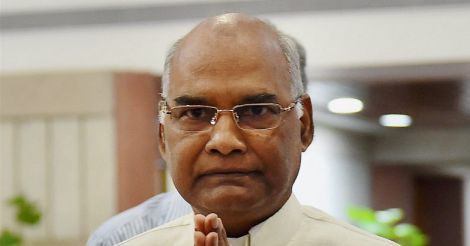Two speeches by president Ram Nath Kovind in October last week, which pointed fingers at the opposition in the two states, have sparked unease in the Karnataka and Kerala units of the BJP.
The president's copious praise for the progress of Kerala in modern times – when ruled by the LDF and the UDF – was not music to the ears of state BJP leaders as the party had launched a virulent campaign under national president Amit Shah's leadership against the ruling LDF government. But what was more difficult to swallow in the speech was Kovind's fulsome praise for Tipu Sultan, who ruled Mysore state for 17 years till he was killed in a war with the British in 1799.
Read: What's holding India back from punching above its weight in sports?
The BJP had upped the ante on Karnataka Congress, which has been celebrating the controversial ruler's birthday, leading to tensions in Kodagu and coastal districts of Dakshina Kannada, Udupi and Karwar, where there are allegations that Tipu targeted Hindus for massacre and rape.
The newly appointed minister of state in Modi government, Ananth Kumar Hegde, had told the state government that his name should not be included in the list of VVIPs for any Tipu celebration, and if it still was done, he would attend and disrupt the program.
The BJP has used the diabolical image of Tipu as its election campaign theme in the sensitive districts for the last two decades, adding details of allegations about Tipu's depredations in Malabar. But the Congress has argued that Tipu was a genuine patriot who fought the British tooth and nail, and hence, his image was deliberately spoilt by British historians and their Indian supporters.
The controversy on Kovind's remarks has once again focused on who the person who drafts his speeches, and the role of the president himself.
Pratap Simha, an MP from Mysore, accused Siddaramaiah of misleading the president by including heroic references to the last Muslim ruler of Mysore. The chief minister washed off his hands saying his government did not send any draft speech to the Rashtrapati Bhavan.
It has been emerged that the legislature secretariat had send inputs on the heroes in different fields, including references to Shankaracharya who set up a temple in Sringeri, and the valorous rulers like Krishnadevaraya of Vijayanagar empire, Rani Chennamma of Kittur and Tippu. There were references to modern generals like field marshal K.M. Cariappa and general K.S. Thimmayya, both from Kodagu.
Read: Modi's next big wager: 'One Nation, One Election'
In the president's speech, the sultan was credited with the invention of rockets, which were later used by the Europeans. Simha mocked the speech of the president, saying if Tipu was so good at rocket development, why didn’t he use them to devastating effect against the British army. However, the Rashtrapati Bhavan has chosen to ignore the criticism and did not reveal any details on the speech's sources.
The president's speeches fall into different categories. The speeches to the joint session of parliament after a Lok Sabha election, and also on the first day of parliament session held every year in February, is completely prepared by the government and approved by the cabinet. The president cannot add or delete anything, although he can suggest changes. But the prime minister decides on whether the suggestion can be approved or not.
K.R. Narayanan, as president, had objected to a paragraph in a speech to parliament prepared by Vajpayee government in 2001. Vajpayee initially refused to change, but after senior advisers held consultations, the words were changed to convey the same feeling, without causing offense.
Similarly, the speeches made by the president during his meetings with foreign heads of government and heads of state in India, or during his visits abroad, are prepared by the ministry of external affairs, and approved by the prime minister's office as these speeches reflect India’s policy.
But presidents well versed in international affairs give their suggestions. Only Neelam Sanjeeva Reddy had refused to read the speeches prepared by the governments of Morarji Desai and Indira Gandhi during 1977-1982 as he felt the president had full powers to conduct foreign policy. The Indira Gandhi virtually reduced his interactions with major world leaders for fear of this independent attitude.
Other speeches delivered by the president, including the addresses to the nation when he becomes president, the day before every Independence Day and Republic Day, as well as when he completes his tenure, are prepared in the Rashtrapati Bhavan.
Every president from the first head of state, Rajendra Prasad, have used some of these speeches to give expressions to their beliefs and also their concerns on the state of the country, especially when the president and the prime minister did not come from the same political background.
Whenever the president accepts invitations from central ministries, state governments, universities or private organizations, the Rashtrapati Bhavan asks for a draft speech to be sent in advance, so that the speechwriters in the president's secretariat can work on a speech to suit the style and substance of the president's personality. Many a time, these draft speeches undergo complete transformation, though Shankar Dayal Sharma and Pratibha Patil were more liberal in relying on the core elements of the draft speeches submitted.
A.P. J. Abdul Kalam had brought retired major general Swaminathan from the defence research and development organization to write the speeches with a focus on self-motivation, supporting society, skill development, and rural upliftment.
But Kovind has shown just in three months that he would articulate his views and opinions in his own unique style.

























